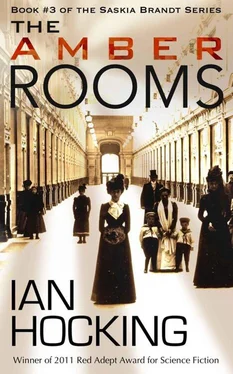And yet, when she had opened her blood-filled eyes on the trees above Turtle Lake, and seen Kamo, her rescuer, confronting the Cossacks of the Kuban Host, she had known that some part of him was worth rescue. They had looked at each other over the bodies of the Cossacks. He had said, ‘I am at your service.’
‘No,’ she had replied. ‘I am at yours.’
They passed through the landing of the main staircase, another dining room, a room decorated with panels of crimson under glass, a portrait gallery, and arrived at the Amber Room. It had three floor-to-ceiling windows with gilt mirrors between them to double the light. Every other surface, excepting the floor and the painted ceiling, was a monument to amber. The centre of the room was occupied by a model of the Berlin monument to Frederick the Great, while its perimeter was filled with white chairs and furniture. Standing around the room—paying particular attention to the model in the centre and the showcases of amber collectibles near the windows—Saskia counted five men and three women. Her eyes stopped, however, on her own reflection, which was reflected in the tall mirror to the right of the far door.
‘Well?’ said Kamo.
She ignored him. Her reflection was impossible. Instead of the Allegory of Night, she saw a woman wearing a sennit hat, a white blouse with puffed shoulders, and green-smoked eyeglasses. Though the virtual distance was considerable, she was certain that the face—and its expression of surprise—was her own. Before she could approach the apparition, Kamo pushed her deeper into the room.
‘Look here,’ he said, gesturing to a clock in the corner. It was a bronze clock with porcelain flowers and leaves. ‘It is two minutes shy of midnight. Now, where is the money?’
Pasha said, ‘I’ve been here before.’
‘I’ve little doubt of it,’ Kamo replied. ‘Hold your tongue. Now, Lynx, where is it?’ He looked at the model of Frederick, whose base, which equalled the height of a man, was the best candidate for the hiding place of the stolen roubles.
Saskia had waited long months to enter this room. She felt a mixture of peace, resignation and stage fright. The threat of Kamo’s gun was a note in the margin of her mind. It did not concern her directly. She found herself more interested in the blank, slackened expression on Pasha’s face. The boy had demonstrated a special connection with the band on her arm. Now, it appeared, he had made a similar connection with this room.
‘Pasha,’ she said, ‘did your illness come to you shortly after your first visit to this room?’
‘Yes,’ said Pasha. For a moment, his eyes were clear. He stared at her. ‘I had my first seizure a month after my tenth birthday. My father had taken me here as a birthday present.’
‘Silence,’ said Kamo. He ground his teeth and put his arm across his chest. His heart had not yet recovered. ‘If you know of the mechanism that reveals the money,’ he whispered, ‘activate it. Now.’
The bronze clock chimed midnight. Saskia knew that it was running fast, and so did two of the guests. They removed their pocket watches and murmured at their dials. Saskia took this as a sign that her band was affecting the time-keeping mechanism inside the clock. She did not understand why the watches of the guests had remained unaffected, but suspected it had something to do with the difference in mass. She considered Kamo. He was tense. Any touch might release his anger. Then he would be impossible to predict.
She decided to tell Kamo that the money was in the base of the model. But as she moved to speak, Pasha interrupted her.
‘“For all ages,”’ he sang, ‘“with his heroic deeds / Stalin has glorified our own people …”’
Pasha was swaying. His eyes were closed and his recital was mechanical, as though the words had been learned by rote by a non-native speaker. His tenor was, however, true.
‘“Over the world waves the Leninist flag / It summons to the path of battle and valour.”’
Saskia saw, at the edge of her vision, a figure enter the room from the direction of the main staircase. The guests put away their pocket watches and listened. Kamo was enthralled, too. The word “Stalin” had not unsettled him to any extent that Saskia could detect. She doubted he had heard it before. His gun arm relaxed and the grimace of pain softened.
‘“Sunny expanses are open to us / The flames of victory light our country.”’
With the slow, inexorable movement of a figurine turning atop a music box, Saskia turned towards the man who had entered the room. It was the photographer. How like a funeral director he looked; all but the black veil on his top hat. He wore a morning suit and simple, black mask. His collar was winged. Only his shoes were flawed: they were dusty. As she watched his soft steps, the hairs on her arms rose. She took a long breath. There was a stiffness in his walk, and his left arm was motionless.
‘“For our happiness lives Comrade Stalin / Our wise leader and dear teacher.”’
The photographer, who had saved Kamo’s life with a flash of magnesium, but had allowed the situation to play out, approached Pasha and looked into his mouth, close enough to kiss.
‘What a wonderful lyric,’ he said. The Russian was fluent but curiously emphasised. It marked him as a native of Georgia, that land of poets and wine. ‘Sing on.’
Saskia said, ‘No.’
Pasha stopped. He remained entranced. His eyes were closed and his body swayed. The photographer turned from Pasha to Saskia. She swallowed. It was pointless denying her fear; the feeling seemed to begin at the soles of her feet and climb to her crown. That was the effect of his look.
The photographer walked to her. Behind him, the remaining guests chuckled at this unusual musical interlude and drifted from the room in the direction of the main staircase, not to miss the unparalleled fireworks display in the square.
Soso, the Georgian bandit who had not until this moment used the name Stalin, reprised a line from the song in his own, exceptional tenor. ‘“ Stalin has glorified our own people.” A good name indeed.’ His gaze moved between Kamo and Saskia. He bowed, then gripped Saskia by the scruff of her neck and kissed her three times. He repeated the same gesture with Kamo but added a small touch of their foreheads, during which both closed their eyes. Kamo seemed to shrink in Soso’s presence.
‘I always preferred The Staggerer,’ said Saskia.
Soso grinned. He seldom laughed, as she recalled, and preferred to hear jokes when they came from his own mouth. Once, Soso had been addressing a secret meeting at the Avlabar People’s Theatre when Saskia, who was on lookout, ran inside with the news that the theatre had been surrounded by police. It had been too late to escape, so Soso ordered the Bolsheviks to burn their papers. When the police entered the building, Soso announced to the inspector that they were rehearsing a play and would be delighted if the policeman could help them out with the role of a swine. Delight abounded among the conspirators. The embarrassed inspector said that he knew what kind of actors they were—but was forced to let them go. Soso had made pig noises as he left. That was the night Soso married Kato. That was two years ago.
‘Lynx, mythic beast who sees through falsehood to the truth beyond,’ said Soso. He grinned again. ‘A long time since our last meeting.’
In a business-like tone, she said, ‘Look what happened in the meantime. You shaved your moustache.’
‘Do you like it?’
‘How is Kato?’
‘I once wrote a poem for you, Lynx. I compared you to the moon.’
‘Why are you here, Soso?’ she snapped. Since their first conversation, she had judged him to value assertiveness. Now, she wished to provoke him. ‘It is dangerous to spread yourself so thinly.’
Читать дальше












